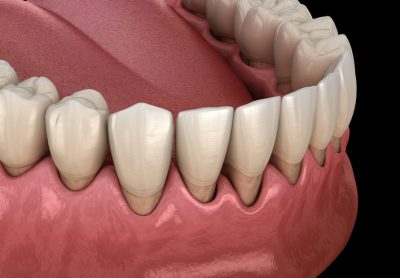Tooth and gum recession is when the margin of the gum tissue surrounding the teeth wears away, or pulls back, exposing more of the tooth, or the tooth’s root. Since the root surface does not have a hard enamel covering as the crown (top) of the tooth does, the root may become sensitive to hot and cold temperatures, air, sour or spicy foods, and sweets. When you can see the roots of the teeth, this is the recession already in progress.
Causes of Tooth Recession
- Gum disease.
- Aggressive toothbrushing.
- Smoking/tobacco use.
- Tooth misalignment.
- Grinding.
- Orthodontics.
When gum disease is present, there may be an infection causing inflammation, redness, and destruction of the fibers that attach the gums to the teeth.
A dentist or registered hygienist can measure how far the disease has progressed with an instrument called a probe. This device can measure the loss in millimeters. More than 3 millimeters suggests that inflammation and gum disease has begun. Gums will recede if this condition is not properly treated.
What Causes Receding Gums?
- Using a medium or hard-bristled toothbrush and aggressively brushing.
- Smoking can also create trauma and is an irritant to the gums
- Crowded teeth increase the risk.
- Clenching can cause abrasion of the tooth enamel.
- Orthodontics, teeth that are moved too rapidly can cause bone loss.
Signs and Symptoms of Tooth Recession
- Sensitivity.
- Exposed root surfaces.
- Redness and swelling of the gums.
- Tooth appearing longer than normal.
The key to preventing recession is to treat early signs of gum disease. Keeping gums healthy will prevent infections from destroying the gums and exposing root surfaces. Using a soft-bristled toothbrush and light pressure to avoid trauma to the gums and to eliminate recession is also another preventive measure. Giving up tobacco products, and speaking to your dentist about wearing a nightguard for grinding/clenching may also help.
Gum recession is a common dental problem that occurs gradually. Generally speaking, good dental hygiene and regular exams with your dentist is your best defense against oral health problems, including gum recession.

